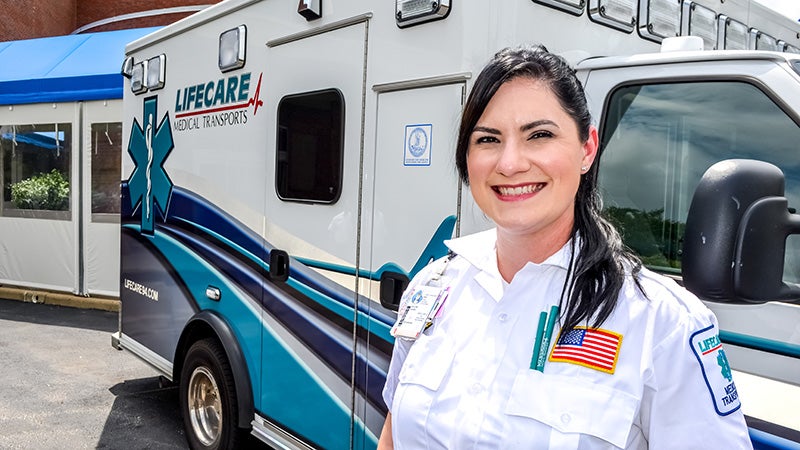EMS Week honors lifesavers
Published 10:17 pm Wednesday, May 23, 2018

- Lifecare Medical Transports Emergency Medical Technician Lauren Collins beside her ambulance parked outside of Bon Secours Health Center at Harbour View.
The men and women in emergency medical services that are first on the scene for some of people’s worst days are being honored in the 44th annual National EMS Week from Sunday to Saturday. The annual celebration was authorized by President Gerald Ford in 1974 to celebrate EMS practitioners and the critical work they do daily, according to naemt.org.
EMS personnel charge into chaotic situations with only their equipment, training and a deliberate calm.
“One of their first jobs is to get things under control, structured and moving forward,” Dr. Carl Wentzel, medical director for Suffolk Department of Fire & Rescue, said in a phone interview. “They should be calm and confident in their skills and their training to go into what seems like a chaotic situation and establish a sense of order.”
Pat Edwards, an advanced emergency department technician for Bon Secours Health Center at Harbour View, has 27 years of EMS experience, including ambulance time in New England, Vermont and New Hampshire. She described going into remote mountains with just her team and equipment.
She learned to walk, not run, into emergency scenes. She said it’s important not to give away the stakes to patients and others desperate to know how bad things are.
“When you get to a scene, everyone is looking at you to see how you react,” Edwards said.
It’s not just about the safety and security of the sick and injured. First responders can find themselves in situations with belligerent patients and family or other hostile individuals.
“You’ve got to be able to improvise a little bit to make sure you’re safe,” said Martin Arriola, paramedic for Lifecare Medical Transports contracted by Bon Secours.
Responders keep in close communication with emergency departments like Bon Secours Health Center at Harbour View to relay the conditions of victims, stabilize them and begin time-sensitive preparations. Valerie Sommer, director of nursing at Bon Secours Health Center, used strokes as an example.
She explained that EMS will get the IV fluid going and brief the ER to prepare the CAT scan and medication with no time to spare.
“We’re able to get them the medication they need for the stroke, which has to be done within three hours of when the symptoms first appear,” she said.
Lifecare Medical Transports Emergency Medical Technician Lauren Collins explained that effective care is made possible through teamwork within the “first responder family.”
“I work with Portsmouth Fire and Rescue, and I know if I’m on the scene I’m working closely with firefighters, my partners in the ambulance and the police department,” she said. “It doesn’t matter if the titles are different. The lines get blurred, because we’re working together as a team.”
She recalled working a drowning case two years ago in the Virginia Beach community of Sandbridge. Firefighters and officers lent their hands to carry the stretcher up the sandy hill and to get the patient in the ambulance and on the road.
Just over a year ago, Collins and some of her EMS colleagues happened to be in the vicinity when two gunshot victims were brought to Bon Secours Health Center. While she was stabilizing one of the victims, the other patient went into cardiac arrest, and EMS just stepped right in to help ER staff.
“We were all medically trained and knew what needed to be done,” Collins said.
These men and women clearly don’t do these jobs for the good paychecks or reasonable work hours.
“You choose to do it because you love it and because you want to help people,” according to Edwards.
Collins has seven years of EMS experience. She faced a choice between becoming a nurse or staying in the ambulance and moving up to paramedic. She said she’s currently in school for the latter, partly because she finds it more rewarding and exciting, but also because she enjoys bringing some light to people’s darkest days.
“I’ve seen plenty in seven years, but it’s nice to know that while it’s not the case for every call, every once in a while, you get to walk away knowing you really did get to help somebody, and that’s nice,” she said.






